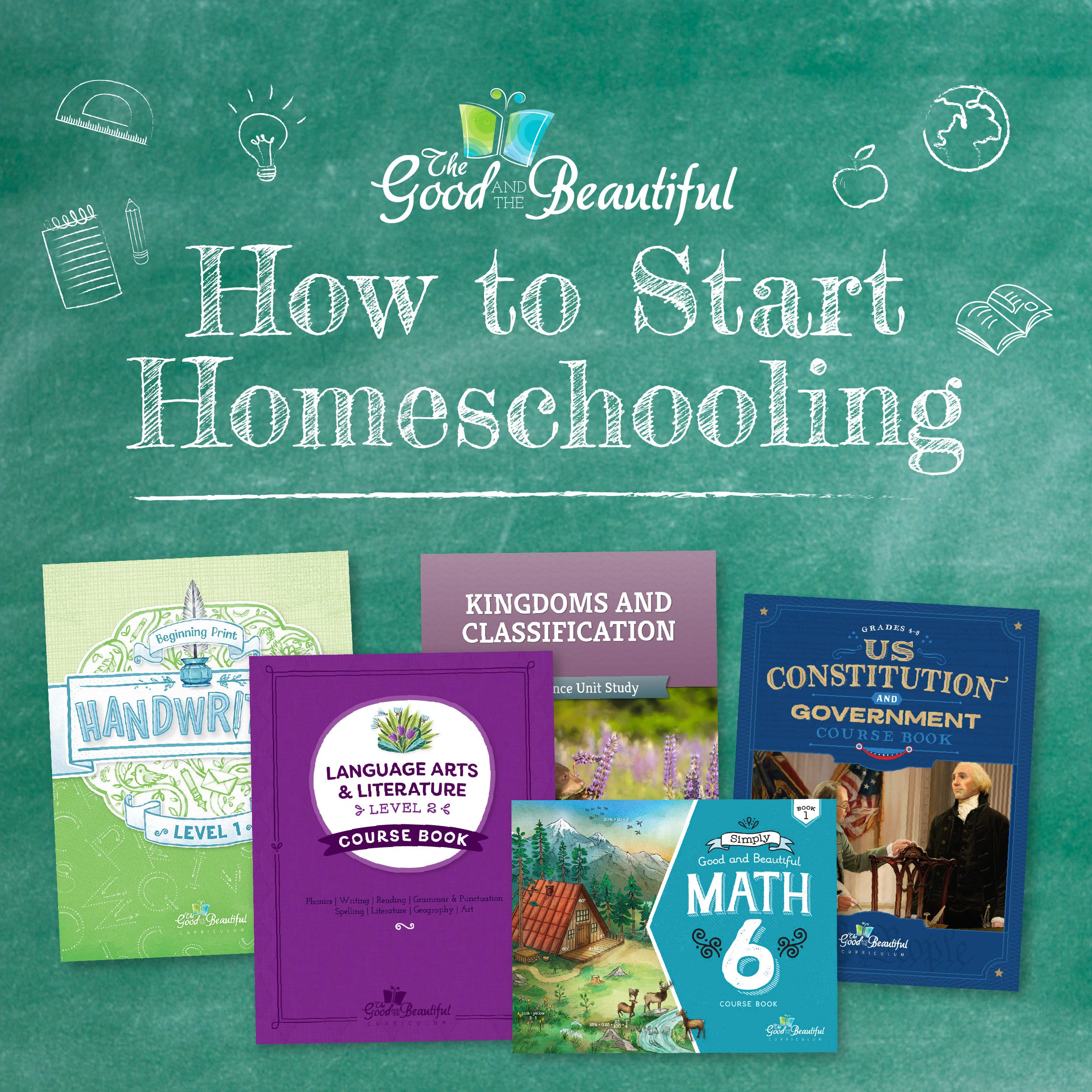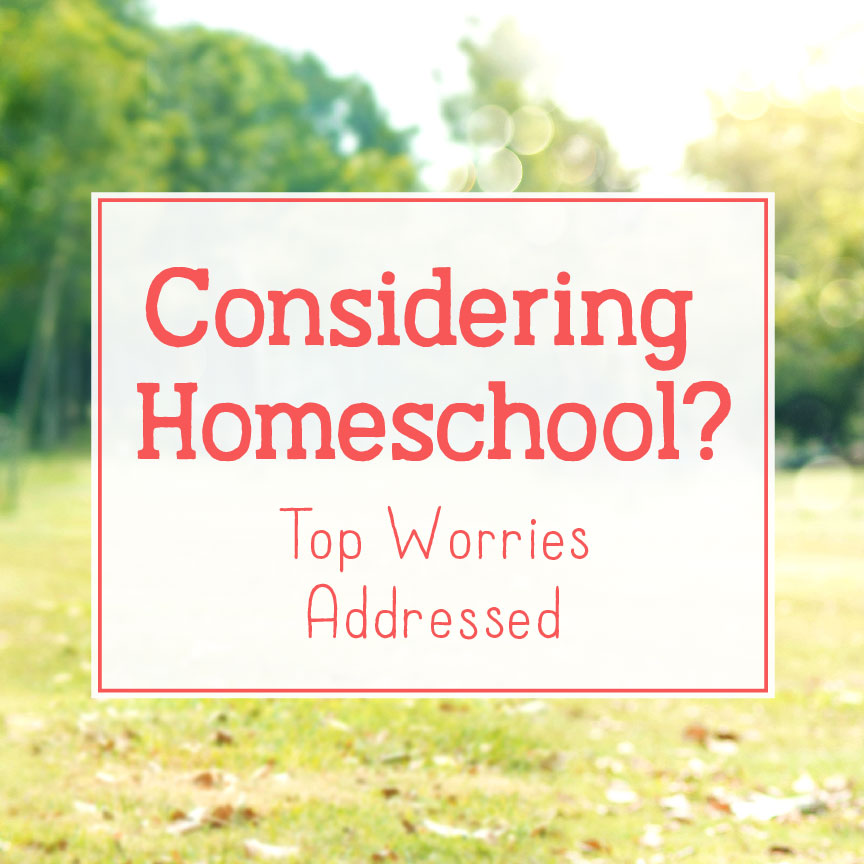
Are you having doubts about homeschooling? You’re not alone! Homeschooling is full of challenges, and it is common to have self doubts about your ability to educate your own children. In this blog post and video, Jenny Phillips, the founder of The Good and the Beautiful encourages parents to persevere. You can homeschool your children and you are qualified.
A Message from Jenny Phillips
As homeschool parents, we know how important our job is, and it's so common to worry that we will mess something up. Now that I have raised three of my children to adulthood, I can confidently say that although there will certainly be days that you worry or even do mess up, a loving and committed parent can and will raise wonderful children and can homeschool those wonderful children, too. The truth is, however, there are so many reasons why parents are qualified to teach their children.
Limiting Homeschool Beliefs
1. Am I qualified to teach my child?
There are limiting beliefs in homeschool that are incorrect. One of them is that you don’t know how to teach your child if you don't have a degree in education. Not only have studies proven this idea wrong, but just think about it. Ask yourself this: Have you mastered the skills that a fifth grader needs to know? I'm sure you have. So, if you arm yourself with an open-and-go curriculum that guides you every step of the way, do you know enough to facilitate your fifth grader's learning? That is an easy yes.
2. Do I need to have all the answers?
Homeschoolers have access to professional, well-designed curriculum in every subject— often with video support. Parents don't have to know it all; they can select the best materials and instructors for their kids. Also, you can’t beat the individual attention children get in homeschool. When you think about it, homeschooling is not just classroom teaching; it’s much closer to tutoring, and most caring people can tutor a child. A parent working individually or in a small group with their kids has a major advantage, even compared to a college-trained teacher handling a classroom of 25 or more kids all at varying levels of academics and behavior.

Consider this: No one is more invested or personally interested in your child than you. That kind of care and motivation often creates a stronger learning environment—and it doesn’t involve things like cramming for a test. What about high school? When homeschoolers get to higher-level subjects like advanced math, science, or foreign languages, parents usually bring in extra support, like co-ops, online courses, community college classes, or tutors.
Helpful Reminder: Homeschooling isn't about the parent standing in front of a whiteboard professing knowledge. It's about guiding the child through resources, discussions, books, and experiences.
3. Will public school fix everything?
Another limiting belief is that if your homeschool is lacking the structure and consistency that you desire, sending your kids back to public school will fix everything. You have to remember that public school isn’t a perfect environment either and has its challenges. So much time is spent moving large groups of students from one activity or space to another. Children are held to levels that may not be right for them. Things may be taught or read that don’t hold your values. And the ratio sometimes becomes 18 or 30 children to one teacher—compared to one-on-one in homeschooling. You also have to factor in the added demand of busy schedules, homework dictated to you, having to correct behaviors learned at school, and more.
And remember, many kids still struggle in public school. Or they don’t get what they need academically, let alone spiritually.
Keep this fact in mind: On average, homeschooled children tend to score higher on the ACT than students in public school.
If you have not truly given homeschooling consistent and genuine effort over a long period of time, you should not quit just yet—and this is why. You have to give yourself the opportunity to gain experience and to figure out your homeschooling. I like to compare it to gardening. There really is no such thing as people who just don't have a green thumb and other people who do. It’s about knowledge and experience. It’s about learning to become observant and sensitive. It’s about trial and even error. It’s about developing a relationship with your child in which the child will learn from you. Make sure to watch my video titled “How to Get Your Homeschooler to Listen and Learn From You.”
Just like most new homeschoolers, most gardeners do not experience a full, bountiful harvest their first year, although they do usually get some wonderful home-grown produce to enjoy.
You CAN teach your child!
- You are qualified to teach your child!
- You don’t need all the answers!
- Public school will not fix everything!
Find more reasons you are qualified to homeschool your child in this encouraging blog post and video.

Investing in the Future
You can’t get too stuck in the moment you are in right now. It’s all about investment over time. It’s about the long term. Each year, a dedicated gardener will find their garden growing more and more abundantly, even if their garden mainly failed the first year or two. And even some master gardeners have less productive years than others when they are in times of stress. In the end, even if you have had some years of difficulty and inconsistency, your harvest still has the likelihood to be SO very much greater than if you had quit homeschooling.
Persist and Pivot
What would you do if you wanted to become better at gardening?? You would study it, practice, watch videos to gain knowledge, and learn from experience. You can do all those things with homeschooling. The greatest blessings in life require persistence and effort.
If you feel like your homeschool is not working, get your journal out: Write down the benefits you are experiencing, and write down what you want to improve on. Take the feelings of doubt and failure as an opportunity to grow in some small ways this year, and you can grow even more next year.
Did you know that one of the very best things you can do to improve your child’s academics is to have them read, read, read a ton of beautifully written books? This one simple habit will improve their writing skills, vocabulary, spelling skills, grammar skills, focus and attention, analytical and logical thinking skills, and the child’s knowledge of people, places, and history. With minimal work, you can procure many books from The Good and Beautiful Book List. Read to your children, and have them read all the time. It’s fun and easy.
-
Go to The Good and Beautiful Book List for a free searchable list of more than 1,000 books for children preschool through high school.
-
Shop at The Good and the Beautiful Bookshop to purchase parent approved books that are uplifting and character building.
Also, take a look at your expectations and make sure they are realistic. To have a successful homeschool, you actually can probably simplify way more than you think. Because you are one-on-one with your child and can place them in the correct level for language arts and math, they don't always need to finish a course book at the end of the school year and begin the next level the following year. It's OK if you take more than one day to complete a lesson or even complete more than one lesson in a day, if you and your children are feeling up to it. It’s OK if you cross out parts of the lessons and only have them do other parts, especially if your child is already grasping the material. As long as you have a strong and beautiful academic curriculum like The Good and the Beautiful, small, consistent steps will add up over time.
Are you running into challenges in your homeschool?
- Make a list of what’s working and what’s not working.
- Evaluate your expectations for your child.
- Watch other videos for more The Good and the Beautiful YouTube channel.
- Pray for guidance.
- Get support from your spouse and other homeschoolers.

I love giving you confidence on your journey to educate the hearts and minds of your children in a way that keeps them close to you and close to God, while also creating strong academics.
“To bring the human race, family by family, child by child, out of the savage and inhuman desolation where He [God] is not, into the light and warmth and comfort of the presence of God, is, no doubt, the chief thing we have to do in the world.”
—Charlotte Mason
Related Posts
-

Planting Seeds by Reading Good Books
Are you looking for clean, age-appropriate books that your children will love, but you don’t have time to preread books yourself? Search The Good and the Beautiful Book List to...
Planting Seeds by Reading Good Books
Are you looking for clean, age-appropriate books that your children will love, but you don’t have time to preread books yourself? Search The Good and the Beautiful Book List to...
Read more Planting Seeds by Reading Good Books -

How to Get Started Homeschooling
Wondering how to get started homeschooling? You’re in the right place. This guide walks you through what you need, how to begin, and how to confidently teach your children at...
How to Get Started Homeschooling
Wondering how to get started homeschooling? You’re in the right place. This guide walks you through what you need, how to begin, and how to confidently teach your children at...
Read more How to Get Started Homeschooling -
 1 comment
1 commentSetting Realistic Homeschool Expectations
How do you set expectations in homeschool that are healthy and realistic? In this blog post and video, Jenny Phillips gives tips and ideas that help alleviate stress and leave...
1 commentSetting Realistic Homeschool Expectations
How do you set expectations in homeschool that are healthy and realistic? In this blog post and video, Jenny Phillips gives tips and ideas that help alleviate stress and leave...
Read more Setting Realistic Homeschool Expectations -

O Christmas Tree
Take a walk through the wintry mountains and celebrate the Christmas season as you sing along with this lovely arrangement of “O Christmas Tree,” brought to you by The Good...
O Christmas Tree
Take a walk through the wintry mountains and celebrate the Christmas season as you sing along with this lovely arrangement of “O Christmas Tree,” brought to you by The Good...
Read more O Christmas Tree -

Stress-Free Housecleaning
Is your daily to-do list feeling overwhelming? Dishes piled in the sink, toys scattered on the floor, loads of laundry to do, and dinner to make—and homeschool the kids? Like...
Stress-Free Housecleaning
Is your daily to-do list feeling overwhelming? Dishes piled in the sink, toys scattered on the floor, loads of laundry to do, and dinner to make—and homeschool the kids? Like...
Read more Stress-Free Housecleaning -
 2 comments
2 commentsWhy Homeschool Parents Are So Effective Without...
“Am I qualified to teach my child?” and “Do I need a teaching degree?” are two commonly asked questions among homeschool parents. Jenny Phillips shares some very reassuring statistics about...
2 commentsWhy Homeschool Parents Are So Effective Without...
“Am I qualified to teach my child?” and “Do I need a teaching degree?” are two commonly asked questions among homeschool parents. Jenny Phillips shares some very reassuring statistics about...
Read more Why Homeschool Parents Are So Effective Without Teaching Degrees -
 1 comment
1 commentWhat a Friend We Have in Jesus
Sing along with this delightful illustrated video of the beloved hymn “What a Friend We Have in Jesus.” Then print and read about the story behind this encouraging song. Jesus...
1 commentWhat a Friend We Have in Jesus
Sing along with this delightful illustrated video of the beloved hymn “What a Friend We Have in Jesus.” Then print and read about the story behind this encouraging song. Jesus...
Read more What a Friend We Have in Jesus -

4 Ways I Fixed Homeschool Meltdowns
Meltdowns can and do happen in any homeschool, but it doesn’t mean throwing in the towel! In this blog post and video, Jenny Phillips shares four ways you can address...
4 Ways I Fixed Homeschool Meltdowns
Meltdowns can and do happen in any homeschool, but it doesn’t mean throwing in the towel! In this blog post and video, Jenny Phillips shares four ways you can address...
Read more 4 Ways I Fixed Homeschool Meltdowns -

4 Ways to Help Your Homeschooler Focus
How can you help your homeschooler focus on lessons when distractions are everywhere? Jenny Phillips shares four quick tips for keeping your homeschooler on task.
4 Ways to Help Your Homeschooler Focus
How can you help your homeschooler focus on lessons when distractions are everywhere? Jenny Phillips shares four quick tips for keeping your homeschooler on task.
Read more 4 Ways to Help Your Homeschooler Focus -
 3 comments
3 commentsHow Do You Celebrate the First Day of Homeschool?
Homeschooling is a blessing in so many ways. The first day of homeschool each year is full of excitement—and maybe a little apprehension. In this blog post we’ve created a...
3 commentsHow Do You Celebrate the First Day of Homeschool?
Homeschooling is a blessing in so many ways. The first day of homeschool each year is full of excitement—and maybe a little apprehension. In this blog post we’ve created a...
Read more How Do You Celebrate the First Day of Homeschool? -

How to Know if Your Homeschooler Is Ready for S...
Many parents wonder, “How can I tell if my child is ready for self-directed work?” Here are some ways to tell if they’re ready, plus tips to help them prepare...
How to Know if Your Homeschooler Is Ready for S...
Many parents wonder, “How can I tell if my child is ready for self-directed work?” Here are some ways to tell if they’re ready, plus tips to help them prepare...
Read more How to Know if Your Homeschooler Is Ready for Self-Directed Work -
 65 comments
65 commentsGood and Beautiful Songs
The Good and Beautiful Songs page contains favorite hymns, Bible songs, nursery rhymes, learning songs, Christmas songs, and calming music. Watch the beautiful and engaging music videos, learn about the...
65 commentsGood and Beautiful Songs
The Good and Beautiful Songs page contains favorite hymns, Bible songs, nursery rhymes, learning songs, Christmas songs, and calming music. Watch the beautiful and engaging music videos, learn about the...
Read more Good and Beautiful Songs -
 24 comments
24 commentsDoes a Faith-Based Education Really Matter?
Does faith-based education really matter or make a difference? In this blog post and video, Jenny Phillips answers these questions and more. She shares how a faith-based education completely and...
24 commentsDoes a Faith-Based Education Really Matter?
Does faith-based education really matter or make a difference? In this blog post and video, Jenny Phillips answers these questions and more. She shares how a faith-based education completely and...
Read more Does a Faith-Based Education Really Matter? -
 111 comments
111 commentsYou Can Homeschool
Beginning homeschooling can feel overwhelming, but with The Good and the Beautiful, you can homeschool! In this video, Jenny Phillips shares how you can overcome some common limiting beliefs about...
111 commentsYou Can Homeschool
Beginning homeschooling can feel overwhelming, but with The Good and the Beautiful, you can homeschool! In this video, Jenny Phillips shares how you can overcome some common limiting beliefs about...
Read more You Can Homeschool -
 1 comment
1 commentAll Things Bright and Beautiful
Sing along with The Good and the Beautiful Kids Choir in this lovely arrangement of All Things Bright and Beautiful. From little flowers and singing birds to running rivers and...
1 commentAll Things Bright and Beautiful
Sing along with The Good and the Beautiful Kids Choir in this lovely arrangement of All Things Bright and Beautiful. From little flowers and singing birds to running rivers and...
Read more All Things Bright and Beautiful -
 11 comments
11 commentsThe Gift of Time Through Homeschooling
Homeschooling gives children and families the valuable gift of time. Jenny Phillips discusses how homeschooling allows children to grow at their own pace, develop and explore interests, and strengthen family...
11 commentsThe Gift of Time Through Homeschooling
Homeschooling gives children and families the valuable gift of time. Jenny Phillips discusses how homeschooling allows children to grow at their own pace, develop and explore interests, and strengthen family...
Read more The Gift of Time Through Homeschooling -
 1 comment
1 commentBattle Hymn of the Republic
His truth marches on in the bold lyrics of “Battle Hymn of the Republic.” This original arrangement from The Good and the Beautiful is performed by Life in 3D. Find...
1 commentBattle Hymn of the Republic
His truth marches on in the bold lyrics of “Battle Hymn of the Republic.” This original arrangement from The Good and the Beautiful is performed by Life in 3D. Find...
Read more Battle Hymn of the Republic -

One, Two, Buckle My Shoe
Sing along with the classic rhyme “One, Two, Buckle My Shoe” in this beautifully illustrated video only from The Good and the Beautiful. Then print the lyrics and read about...
One, Two, Buckle My Shoe
Sing along with the classic rhyme “One, Two, Buckle My Shoe” in this beautifully illustrated video only from The Good and the Beautiful. Then print the lyrics and read about...
Read more One, Two, Buckle My Shoe -

There Is Sunshine in My Soul Today
See Jesus all around you in the hymn, “There Is Sunshine in My Soul.” Desi and Seli of Elenyi Music, accompanied by pianist Jamie Johnson, sing about the beauty of...
There Is Sunshine in My Soul Today
See Jesus all around you in the hymn, “There Is Sunshine in My Soul.” Desi and Seli of Elenyi Music, accompanied by pianist Jamie Johnson, sing about the beauty of...
Read more There Is Sunshine in My Soul Today -

Here We Go Round the Mulberry Bush
Help your preschooler develop good morning habits with the song “Here We Go Round the Mulberry Bush.” Watch and sing along with this adorable illustrated video to make getting ready...
Here We Go Round the Mulberry Bush
Help your preschooler develop good morning habits with the song “Here We Go Round the Mulberry Bush.” Watch and sing along with this adorable illustrated video to make getting ready...
Read more Here We Go Round the Mulberry Bush


























2 comments
This is exactly what I needed to hear!
I definitely needed the reminder of having realistic expectations. I frequently want to get each lesson done in one day even though we may need a couple days to finish a single lesson.